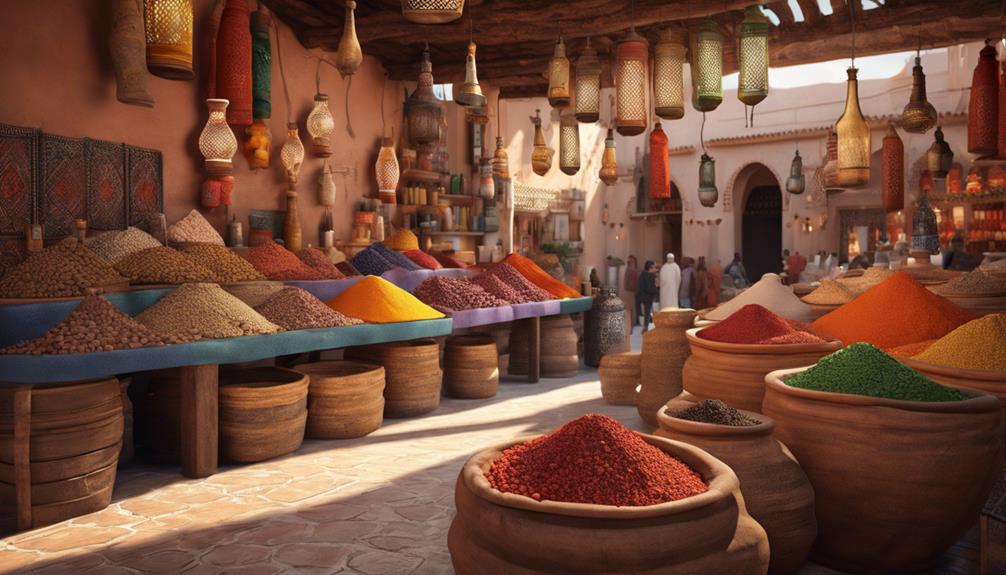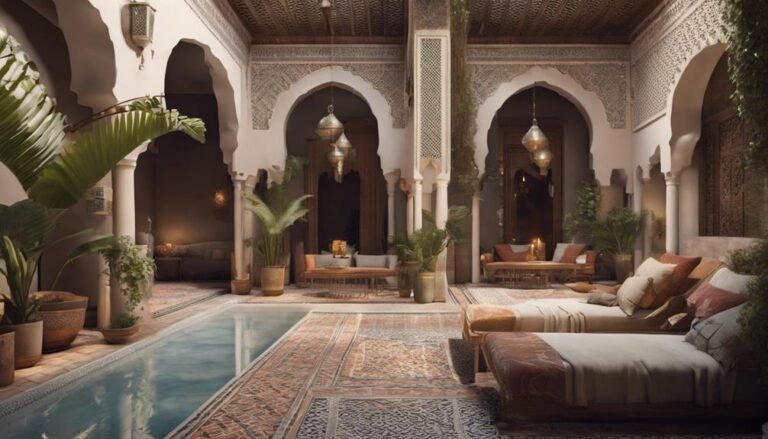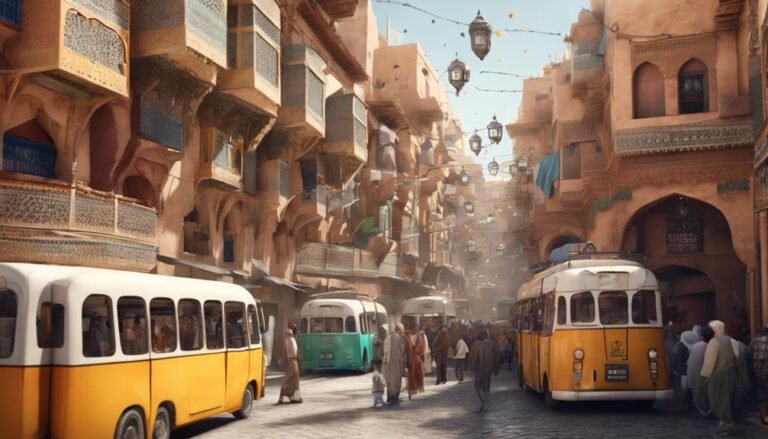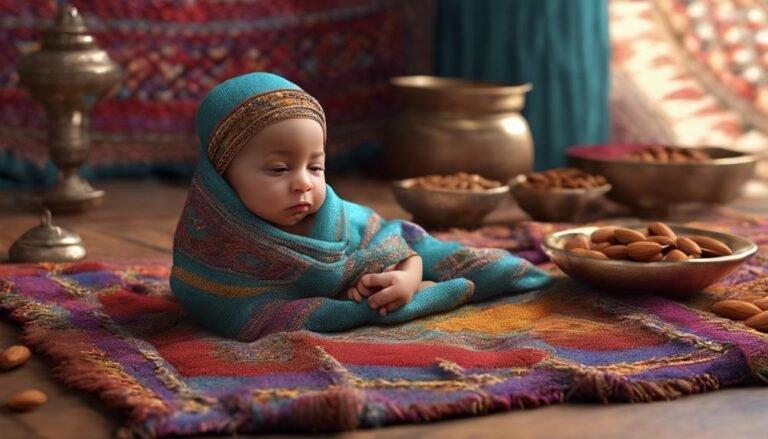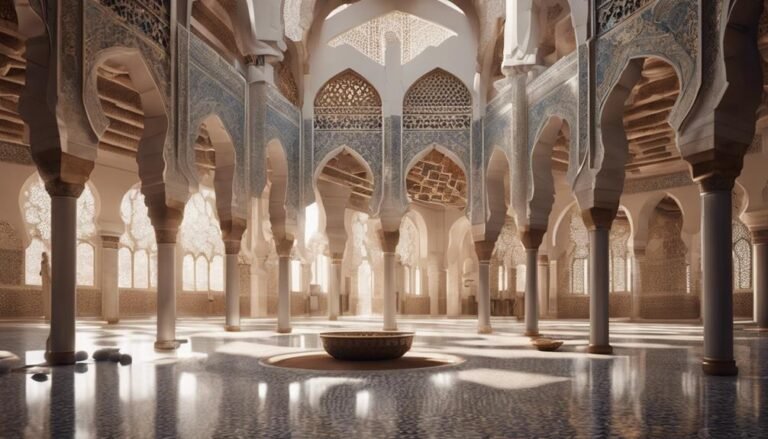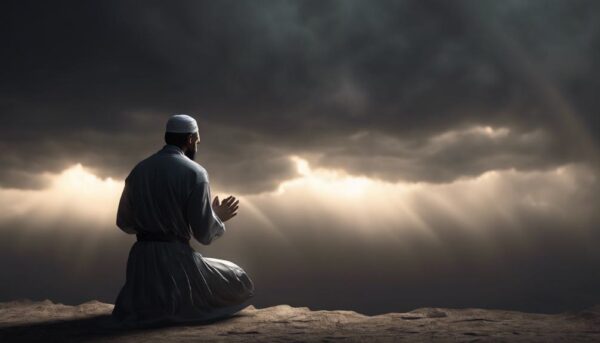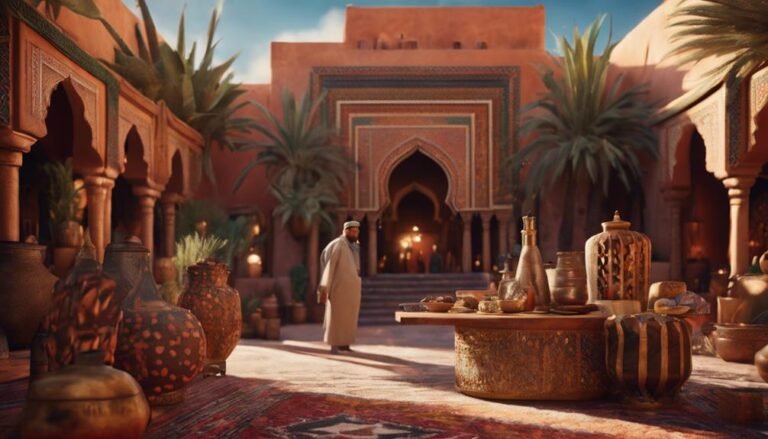In Morocco, the legal drinking age and minimum age for alcohol consumption is set at 18. Public intoxication is discouraged, and you must adhere to local customs and regulations. Alcohol can only be consumed in licensed venues, with sales prohibited during religious holidays. Businesses must meet strict licensing requirements for selling alcohol, with penalties for violations including fines and license revocation. Allowed alcohol types include beer, wine, and spirits, subject to legal limits. Understanding Moroccan laws on alcohol is essential to avoid legal issues and respect cultural norms. Compliance is key to ensuring a smooth experience in the domain of alcohol in Morocco.
Key Takeaways
- Legal drinking age in Morocco is 18.
- Public intoxication is not tolerated.
- Sale of alcohol is restricted to licensed venues.
- Strict regulations govern alcohol advertising.
- Violations of alcohol laws can result in fines, community service, or legal proceedings.
Legal Drinking Age in Morocco
In Morocco, the legal drinking age is set at 18 years old, in line with the minimum age for alcohol consumption established by law. This regulation reflects both legal requirements and cultural norms within the country. Moroccan society generally considers 18 as the appropriate age for individuals to begin consuming alcohol responsibly, aligning with broader cultural attitudes towards adulthood and maturity.
Public consumption of alcohol in Morocco is generally accepted within certain contexts, such as designated bars, restaurants, and private settings. While alcohol consumption isn't uncommon in social gatherings, public intoxication is generally frowned upon. It's important to be mindful of local customs and regulations regarding alcohol consumption to avoid any cultural misunderstandings or legal issues.
Alcohol Sale and Distribution Regulations
When it comes to alcohol sale and distribution regulations in Morocco, you must be aware of the strict sale restrictions in place. Understanding the licensing requirements for selling alcohol is vital for compliance with Moroccan laws.
Sale Restrictions in Morocco
Alcohol sale and distribution regulations in Morocco impose strict limitations on the commercial availability of alcoholic beverages. Public consumption of alcohol is restricted to licensed venues such as hotels, bars, and clubs, with stringent penalties for those caught drinking in public spaces.
Cultural perceptions play a significant role in shaping these restrictions, as alcohol consumption is viewed differently in Morocco compared to other countries. The sale of alcohol is also prohibited during religious holidays and events, reflecting the country's respect for Islamic traditions.
These regulations aim to maintain social order and respect for cultural norms surrounding alcohol consumption in Morocco. Understanding and adhering to these sale restrictions is essential for residents and visitors to avoid legal repercussions.
Licensing Requirements for Alcohol
Strict licensing requirements govern the sale and distribution of alcoholic beverages in Morocco. To navigate the regulations effectively, it's important to understand the following key points:
- Alcohol Importation Laws and Licensing: Importing alcohol into Morocco requires specific permits and adherence to strict guidelines set by the government to guarantee compliance with legal standards.
- Alcohol Consumption Customs and Traditions: Moroccan society has unique customs and traditions surrounding alcohol consumption, which influence the licensing process and the sale of alcoholic beverages in the country.
- Regulatory Compliance: Businesses must uphold rigorous regulatory standards to obtain and maintain the necessary licenses for selling alcohol, demonstrating a dedication to responsible practices in the distribution of alcoholic products.
Penalties for Violations
To uphold compliance with Moroccan laws on alcohol, understanding the penalties for violations in the sale and distribution regulations is essential for businesses operating in the country.
Failure to adhere to these regulations can result in severe legal consequences, including hefty penalty fines. Businesses found selling or distributing alcohol without the proper licenses or outside of permitted hours may face substantial financial penalties.
Additionally, repeat offenses or serious violations could lead to more severe repercussions such as license revocation or even legal action. It's important for businesses in Morocco to meticulously follow the alcohol sale and distribution regulations to avoid facing these penalty fines and potential legal consequences, which could greatly impact their operations and reputation.
Types of Alcohol Permitted in Morocco
When considering the types of alcohol permitted in Morocco, it's crucial to grasp the specific categories allowed by law.
Moroccan regulations outline the legal limits for alcohol content in beverages that can be sold and consumed.
Additionally, the sale of alcohol is tightly controlled and subject to strict governmental regulations to guarantee compliance with the law.
Allowed Alcohol Types
Alcohol types that are permitted in Morocco include beer, wine, and spirits. When enjoying these beverages, it's crucial to take into account their cultural significance and how they complement Moroccan cuisine.
Here are three key points to bear in mind about the allowed alcohol types in Morocco:
- Alcohol consumption: While alcohol consumption is allowed in Morocco, it's important to be mindful of cultural norms and drink responsibly, especially in public spaces and during religious holidays.
- Tourism: For tourists visiting Morocco, exploring the local wines and spirits can add a unique dimension to the travel experience, providing insights into the country's drinking traditions.
- Moroccan cuisine, wine pairings: Pairing local wines with traditional Moroccan dishes can enhance the dining experience, bringing out the flavors and nuances of both the food and the drink.
Legal Alcohol Limits
Legal alcohol limits in Morocco encompass beer, wine, and spirits as the permitted types of alcoholic beverages. The legal drinking age in Morocco is 18 years old, and individuals must show identification when purchasing alcohol.
Public consumption of alcohol is generally acceptable in licensed venues such as bars, restaurants, and hotels. However, it's important to note that public intoxication isn't tolerated in Morocco, and individuals should consume alcohol responsibly. Additionally, drinking alcohol in public spaces such as streets or parks is prohibited.
Understanding and adhering to these legal alcohol limits regarding the type of alcohol permitted, drinking age, and public consumption is essential to avoid any legal issues while enjoying alcoholic beverages in Morocco.
Alcohol Sales Regulation
Moving on from legal alcohol limits, the regulation of alcohol sales in Morocco dictates the specific types of alcoholic beverages permitted for sale within the country. When it comes to alcohol consumption and public health, the Moroccan government has established strict guidelines to guarantee the well-being of its citizens.
Here are the types of alcoholic beverages permitted for sale in Morocco:
- Beer: Beer is widely available in Morocco and is a popular choice among locals and tourists alike.
- Wine: Morocco has a growing wine industry, and certain types of wines are permitted for sale in designated establishments.
- Spirits: Limited types of spirits, such as whiskey and vodka, are available in licensed venues for those who prefer stronger alcoholic beverages.
Alcohol Consumption in Public Places
In public spaces within Morocco, the consumption of alcoholic beverages is strictly regulated by law. The authorities in Morocco have stringent rules regarding alcohol consumption in public places to maintain social order and prevent public intoxication. Alcohol consumption in public places is closely monitored to guarantee that individuals don't engage in disruptive or inappropriate behavior that could lead to social consequences.
Moroccan laws aim to uphold societal norms and protect public safety by restricting the consumption of alcohol in areas where it may lead to disturbances or public disturbances. Individuals are expected to adhere to these regulations to avoid any legal repercussions that may arise from violating the laws governing alcohol consumption in public spaces. It's essential for residents and visitors alike to be aware of these regulations and act responsibly when consuming alcohol in public to avoid any conflicts with the law enforcement authorities. Failure to comply with these laws may result in penalties or fines, as Moroccan authorities prioritize maintaining public order and safety.
Penalties for Alcohol Violations
Violating Moroccan laws on alcohol consumption in public spaces can result in significant penalties and fines. The legal system in Morocco takes alcohol violations seriously to uphold social norms and public order. Here are some of the consequences individuals may face if found in violation:
- Fines: Individuals caught consuming alcohol in public spaces may face hefty fines as a penalty for their actions. These fines can vary depending on the severity of the violation and are imposed to discourage further breaches of the law.
- Community Service: In some cases, individuals found guilty of public intoxication or violating alcohol consumption laws may be required to perform community service as part of their punishment. This serves as a way for offenders to give back to society and make amends for their actions.
- Legal Proceedings: Those who repeatedly violate alcohol consumption laws or engage in public intoxication may face legal proceedings that could result in more severe consequences, such as imprisonment or a criminal record. It's essential to adhere to Moroccan laws regarding alcohol to avoid these potential outcomes.
Alcohol Advertising Restrictions
To adhere to Moroccan laws on alcohol, adherence to strict restrictions on alcohol advertising is essential to maintain compliance and uphold societal standards. Alcohol consumption is a sensitive subject in Morocco, and regulations are in place to control the promotion of alcoholic beverages. Marketing strategies for alcohol products must align with the guidelines set forth by the government to guarantee responsible advertising practices.
In Morocco, alcohol advertising is heavily regulated to mitigate the potential negative impact on public health and morality. Marketing campaigns mustn't target minors or portray alcohol consumption in a way that encourages excessive drinking. Advertisements promoting alcohol should be mindful of cultural sensitivities and avoid any content that may be deemed offensive or inappropriate.
Moreover, all alcohol advertising materials must carry health warnings and information about the responsible consumption of alcohol. These measures aim to educate consumers about the potential risks associated with excessive drinking and promote a more balanced approach to alcohol consumption in Moroccan society. By adhering to these advertising restrictions, businesses can contribute to the responsible promotion of alcohol products while complying with Moroccan laws.
Licensing Requirements for Alcohol Establishments
Strict adherence to Moroccan laws on alcohol also necessitates compliance with specific licensing requirements for alcohol establishments within the country. When opening an alcohol establishment in Morocco, here are the key licensing regulations you need to be aware of:
- Alcohol Consumption Rules: Alcohol establishments in Morocco must adhere to strict regulations concerning who can consume alcohol on the premises. This includes age restrictions and limitations on the sale of alcohol to intoxicated individuals.
- Operating Hours: Licensing requirements dictate the specific hours during which alcohol establishments are permitted to operate. It's important to follow these guidelines to avoid any legal repercussions.
- Security Measures: Alcohol establishments are required to have adequate security measures in place to ensure the safety of patrons and prevent any incidents related to alcohol consumption.
Cultural Attitudes Towards Alcohol in Morocco
Culturally dominant perceptions surrounding alcohol in Morocco play a significant role in shaping societal norms and behaviors. In Moroccan society, alcohol consumption is often viewed through the lens of cultural norms and religious beliefs. While moderate alcohol consumption is accepted in certain social gatherings, particularly in urban areas and tourist destinations, excessive drinking is generally frowned upon. Religious beliefs, mostly rooted in Islam, also influence societal views on alcohol. Islam prohibits the consumption of alcohol, leading to a more conservative approach towards drinking in many Moroccan communities.
Moroccan cultural norms emphasize hospitality and socializing, where offering guests drinks is a common practice. However, there's a fine line between hospitality and excessive drinking, with moderation being key. In traditional settings, such as rural villages or more religiously conservative areas, alcohol consumption may be less prevalent due to stricter adherence to Islamic teachings.
Conclusion
To sum up, Moroccan laws on alcohol are strict and heavily regulated. The legal drinking age is 18, with specific regulations on the sale and distribution of alcohol. Only certain types of alcohol are permitted, and consumption in public places is restricted.
Violations of alcohol laws can result in penalties, and advertising restrictions are in place. Establishments serving alcohol must adhere to licensing requirements. Overall, cultural attitudes towards alcohol in Morocco are conservative and reflect the country's Islamic values.

The Editorial Team is a passionate group of Morocco enthusiasts dedicated to sharing the beauty, culture, and wonders of this captivating country. With diverse backgrounds and a deep love for travel, we strive to bring you engaging and informative content that inspires your Moroccan adventures. From uncovering hidden gems and sharing local insights to exploring mouthwatering cuisine and showcasing the vibrant lifestyle, our team is committed to providing you with valuable resources and exciting stories that enhance your exploration of Morocco. Join us on this journey as we celebrate the rich heritage and unforgettable experiences that make Morocco truly special.

